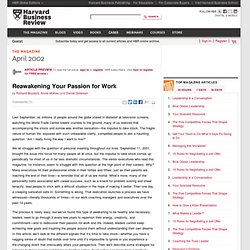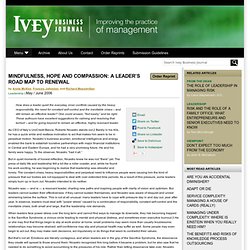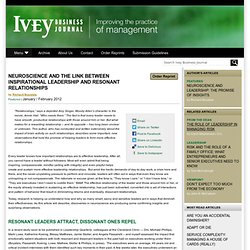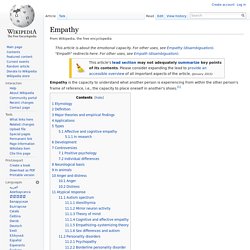

Leading through emotions. Reawakening Your Passion for Work. The Idea in Brief We all periodically face the haunting question: “Am I really living the way I want to live?”

For executives, this question often arises at the apex of their careers—when aging parents or milestone birthdays remind them of their mortality. At these times, many people experience a creeping sensation that something is wrong. Exploring this question is usually painful and messy. But it’s essential for renewing your energy, creativity, and commitment—and your ability to inspire others.
How to begin? The Idea in Practice Taking Stock These feelings may signal it’s time to take stock: “I feel trapped.” Watch for quiet signals especially. Renewing Professional Passion To interpret vital signals and revive your energy for work, use one or more of these approaches: Call a time-out. BFGoodrich president John Lauer decided he’d had enough of corporate leadership—and left to help refugees.
Create “reflective structures.” When to Say When “I feel trapped.” “I’m bored.”
Understanding Diversity: Women Drivers and other Stereotypes. Understanding Emotional Intelligence: The Trap of Self-Reference. Understanding Emotional Intelligence: The Amygdala Hijack. MINDFULNESS, HOPE AND COMPASSION: A LEADER’S ROAD MAP TO RENEWAL. How does a leader quell the everyday, inner conflicts caused by the heavy responsibility, the need for constant self-control and the inevitable crises – and still remain an effective leader?

One could answer, “Not easily,” and be right. These authours have excellent suggestions for calming and resolving that turmoil – and for going beyond to remain an effective, highly resonant leader. As CEO of Italy’s UniCredit Banca, Roberto Nicastro stands out.2 Barely in his 40s, he has a quick smile and restless inclination to act that makes him seem to be in perpetual motion. Nicastro’s business acumen, emotional intelligence and energy enabled the bank to establish lucrative partnerships with major financial institutions in Central and Eastern Europe, and he had a very promising future. He and his family were happy. But in quiet moments of honest reflection, Nicastro knew he was not “there” yet. But that’s not all.
Managing the cycle of sacrifice and renewal. Neuroscience and the Link Between Inspirational Leadership and Resonant Relationships. “Relationships,” says a dejected Alvy Singer, Woody Allen’s character in the movie, Annie Hall.

“Who needs them.” The fact is that every leader needs to have smooth, productive relationships with those around him or her. But what makes for a rewarding relationship – and its opposite – has long been unclear or unknown. This author, who has conducted and written extensively about the impact of brain activity on such relationships, describes some important, new observations that hold the promise of helping leaders to form more effective relationships.
Every leader knows how important relationships are to effective leadership. Today, research is helping us understand how and why so many smart, savvy and sensitive leaders act in ways that diminish their effectiveness. Resonant leaders attract, dissonant ones repel In a recent study soon to be published in Leadership Quarterly, colleagues at the Cleveland Clinic — Drs. We also witnessed the activation of parts of the Default Mode Network. StudyRoom. Inspiring Leadership through Emotional Intelligence. Empathy. Empathy is the capacity to understand what another person is experiencing from within the other person's frame of reference, i.e., the capacity to place oneself in another's shoes.[1] Etymology[edit] The English word is derived from the Ancient Greek word ἐμπάθεια (empatheia), "physical affection, passion, partiality" which comes from ἐν (en), "in, at" and πάθος (pathos), "passion" or "suffering".[2] The term was adapted by Hermann Lotze and Robert Vischer to create the German word Einfühlung ("feeling into"), which was translated by Edward B.

Titchener into the English term empathy.[3][4] Alexithymia (the word comes from the Ancient Greek words λέξις (lexis, "diction", "word") and θυμός (thumos, "soul, as the seat of emotion, feeling, and thought") modified by an alpha-privative, literally meaning "without words for emotions"), is a term to describe a state of deficiency in understanding, processing, or describing emotions in oneself.[5] Definition[edit] Applications[edit] Types[edit]